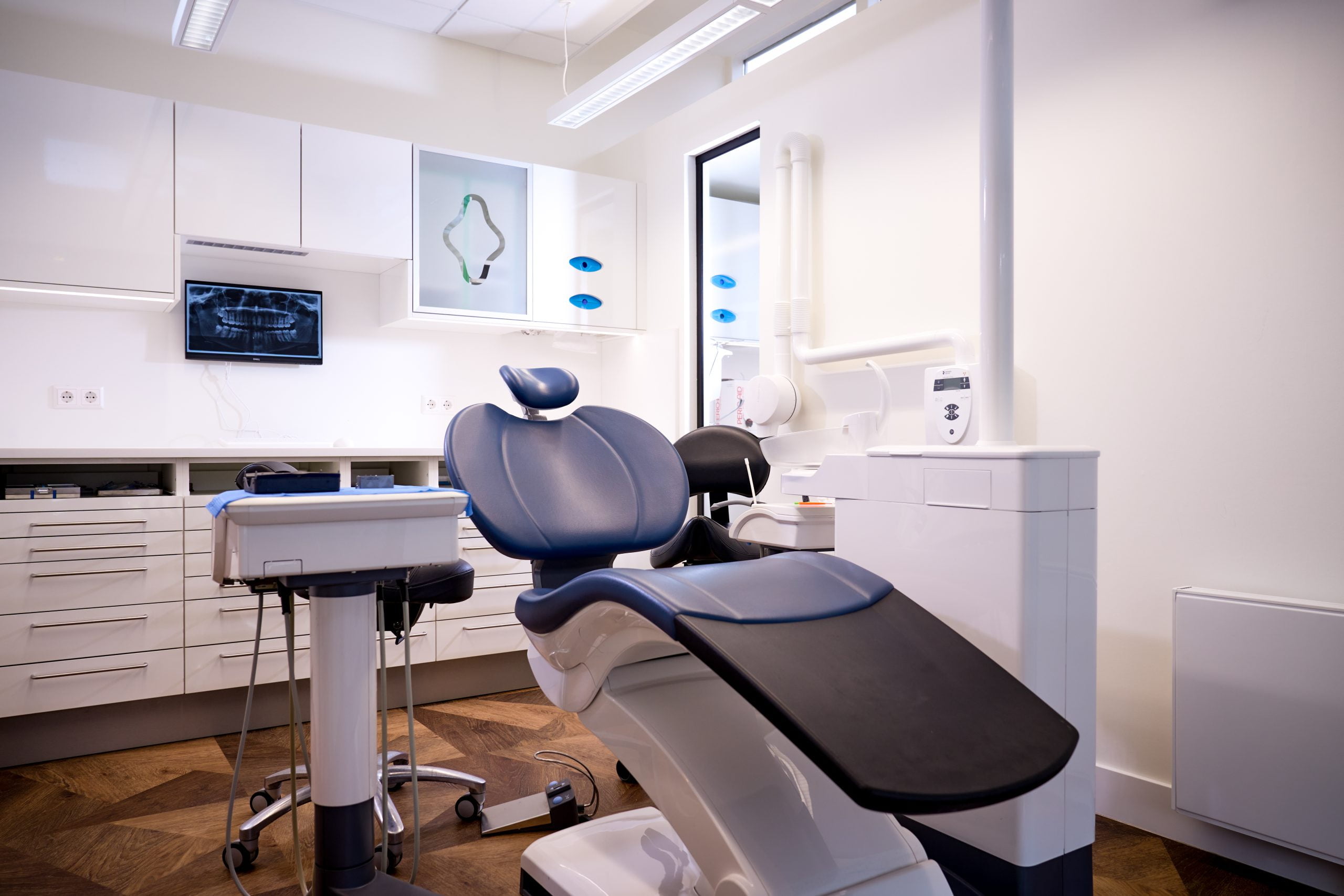Veneers
Dental Practice Johan HuizingalaanVeneers are a popular cosmetic dental treatment that more and more people are choosing to improve their smile. The treatment is relatively quick, painless and affordable, making veneers an attractive option for people looking for a quick and effective way to improve their teeth. On this page, you can read more about what veneers are, the different types available, and what you can expect from a veneers treatment in our dental practice in Amsterdam Nieuw-West.

What are veneers?
Veneers are thin shields of tooth-coloured material (such as composite or porcelain) that are placed on the front of the teeth to solve aesthetic or functional problems. Veneers can be used to hide discolorations, crooked teeth, gaps between teeth, chipped teeth, wear of tooth enamel and other dental irregularities.

Why have veneers placed?
There are several reasons why you might want to have veneers placed. A common reason for placing veneers is to improve teeth’ aesthetics. Maybe you are not satisfied with your teeth due to discolouration or because of the position of your teeth. In these cases, veneers can offer a solution to eliminate these irregularities and thus create a more aesthetically pleasing smile.
In addition, veneers can also be used to improve the functionality of the teeth. For example, if there is wear of the tooth enamel or if a tooth has broken off, a veneer can protect the tooth and restore its functionality.
Finally, veneers can also be placed if you suffer from painful or overly sensitive teeth. The veneers can then protect your teeth and reduce their sensitivity.
However, it is important to remember that veneers are not always the best solution and that other treatments are sometimes possible to achieve the desired results. We always recommend that you consult with your dentist to discuss the best options and make an informed decision.
Different types of veneers
There are two types of veneers that are commonly used in dentistry: composite veneers and porcelain veneers. We offer both sorts of veneers in our dental practice in Amsterdam Nieuw-West The veneers each have their own advantages and disadvantages. Which type of veneers is most suitable depends on your specific needs.
Composite facings
A composite veneer is a thin layer of tooth-coloured composite that is applied directly to the teeth and then shaped and hardened. It is a relatively cheap and quick treatment and can usually be performed in one appointment.
| Affordable compared to porcelain veneers | Can be applied in a single appointment | Can be removed and replaced if necessary | Usually requires little or no dental tissue removal |
| Can break, discolour and/or wear out more quickly than porcelain veneers | The colour sometimes doesn't match your natural tooth colour as well |
Porcelain veneers
A porcelain veneer is a thin layer of porcelain that is manufactured in a dental laboratory and then placed on the teeth by your dentist. Porcelain veneers offer a more durable and natural appearance than composite veneers and are, therefore, more popular with clients looking for long-lasting results.
| Gives the teeth a more natural appearance than composite veneers | More durable and less sensitive to discolouration and abrasion than composite veneers | Better suited for larger cosmetic changes, such as changing the shape, size and colour of the teeth |
| More expensive than composite veneers | Several appointments are required to manufacture and place the porcelain veneers | Cannot be removed or replaced without damaging the tooth tissue | Requires more tooth tissue removal than composite veneers |
Have veneers placed
If you’re considering having veneers placed, it’s good to know what you can expect during the treatment. Below you will find a general overview of the steps involved in placing veneers. No distinction is made between porcelain and composite veneers. A difference in the treatment is that two appointments are required for porcelain veneers and for a composite veneer you can walk out with your new teeth the same day.
Consultation and planning
During your first appointment, your dentist will assess your teeth and discuss what you want to achieve with the veneers. Your dentist will also discuss the different types of veneers with you and help you choose the material that suits you best.
Preparation of the teeth
Prior to the veneers being placed, the dentist will grind off a thin layer of the tooth surface if necessary to make room for the veneers. This process is generally painless and is performed under local anesthesia. Sometimes placing veneers without grinding is also possible. The advantage of this is that you completely keep your own teeth. However, this is only possible if you have small and/or narrow teeth or, for example, if there is a gap between your teeth. After all, there is already enough room for the facing.
Take impressions
After your teeth have been prepared, your dentist will take impressions of your teeth to tailor the veneers.
Placing of the veneers
Once the veneers have been custom-made, your dentist will place them on your teeth using a special adhesive. After placing the veneers, your dentist will polish them to ensure they fit properly and look natural.

Veneers costs
The costs of veneers depend on the type of veneers you choose and the number of veneers you have placed. Below you will find the cost of composite and porcelain veneers.
| V15 | Applying a shield made of tooth-coloured plastic material (veneer) | €84.48 |
| R78 * | Ceramic or plastic shield, without preparation | €84.48 |
| R79 * | Ceramic or plastic shield, with preparation | €140.80 |
* Excluding technology costs
Veneers/Facings tandarts Amsterdam Nieuw-West
Are you looking for a veneers dentist in Amsterdam Nieuw-West? Then you’re at the right place at Johan Huizingalaan dental practice. Are you already a client of ours? Then contact us to make an appointment to have veneers placed. Are you not yet registered at our practice? No problem. Registering can easily be done via our website.
You can also contact us for other specialist dental treatments For example, this could include having a dental prosthesis placed or a root canal treatment performed. Of course, we also provide general dentistry. Scheduling your periodic check-up is extra easy with us given our long opening hours. You are also welcome with us evenings and at weekends. We look forward to welcoming you!
Frequently asked questions veneers
How long on average do veneers last?
In general, porcelain veneers last longer than composite veneers. Porcelain veneers last on average between 10 and 15 years, while a composite veneer generally lasts between 5 and 10 years. However, it is important to note that the durability of veneers depends not only on the material but also on how well they are maintained. It is therefore important to have regular check-ups and professional cleanings, and to maintain good oral hygiene by brushing and flossing.
What should I take into account after having veneers placed?
Your veneers may feel a bit uncomfortable at first, especially if the shape of your teeth has changed significantly. Furthermore, veneers do not require any specific treatment. So you can behave the same way as you would with your natural teeth. It is also important to take good care of your veneers so that you can enjoy them for as long as possible. Moreover, this positively contributes to your overall oral health.
Can veneers simply come off?
It is not very common, but it is possible for veneers to come off. In most cases, veneers stay in place if properly installed and maintained. Some reasons why veneers can still come loose are:
- Poor adhesion of the facing
- Trauma or injury to the face
- Grinding your teeth
- Aging of the facing
If your veneers have become loose, you should contact us as soon as possible to have them reattached. Do not attempt to attach the veneers yourself. This can damage your teeth. Your dentist will determine whether the veneers can be reattached or whether new veneers need to be placed.
How do I keep my veneers white?
To keep your veneers white, having good oral hygiene and visiting your dentist regularly for professional cleanings are important. Here are some tips that can help you keep your veneers white:
- Brush and floss regularly: Brush your teeth twice a day with fluoride toothpaste and floss daily to remove plaque and tartar. Brushing gently and not using a hard toothbrush is important, as this can damage the veneers.
- Avoid certain foods/drinks: Try to limit foods and drinks that can cause discolouration as much as possible. This includes coffee, tea, red wine and soft drinks.
- Don’t smoke: Smoking can not only discolour your teeth, but it can also damage the veneers.
- Use mouthwash: Antibacterial mouthwash can help reduce bacteria and keep your breath fresh. It can also help keep your veneers clean and white.
- Regular dental checkups and cleanings: Visit your dentist regularly for checkups and professional cleanings. A dentist can remove tartar and plaque from your teeth and veneers and detect and treat any problems in a timely manner.
Does my health insurance reimburse veneers?
Your basic health insurance does not reimburse veneers. If desired, you can take out additional dental insurance for this. Please read the policy conditions carefully, as the amount of compensation may differ per insurance policy.
Are the veneers simply placed at your dental practice in Amsterdam Nieuw-West?
Placing veneers is a cosmetic dental treatment. Our dentists specialize in this, so you can simply visit our dental practice in Amsterdam Nieuw-West.